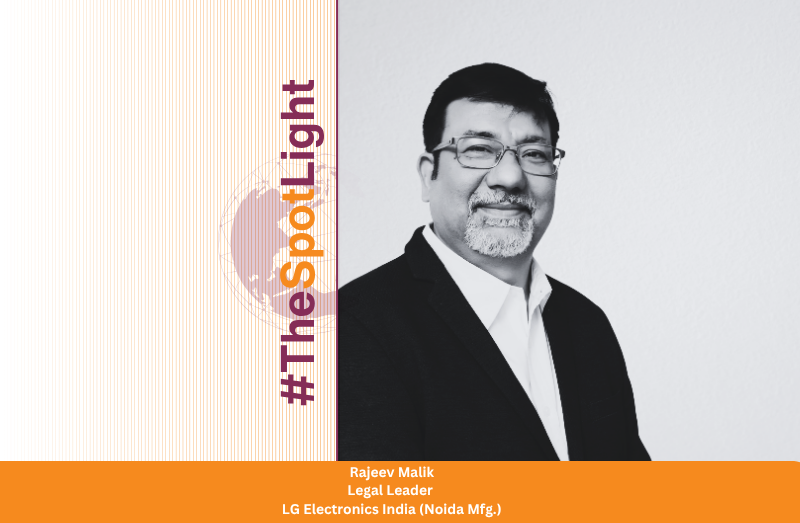“Legal leadership isn’t just about knowing the law, it’s about having the conviction to uphold it, even when the more straightforward path lies elsewhere."
From factory floors to boardrooms, what’s the toughest legal decision you’ve had to make in manufacturing, and what did it teach you?
As an in-house counsel working closely with manufacturing teams, the toughest decisions often involve balancing commercial urgency with long-term legal and ethical considerations. Whether it’s advising on complex vendor relationships, navigating regulatory grey zones, or ensuring compliance amid business pressures, the challenge lies in making decisions that may not be the most popular in the moment, but are right for the organization in the long run.
What it has consistently taught me is that, legal leadership isn’t just about knowing the law, it’s about having the conviction to uphold it, even when the more straightforward path lies elsewhere.
In a fast-paced production environment, how do you balance operational speed with airtight risk management?
In manufacturing, speed is non-negotiable, but neither is compliance. The key is integrating legal protocols into the operational DNA. I’ve found that early involvement in process design, coupled with the use of automation and digital tools, helps build “compliance by design.”
When risk management becomes part of the workflow, rather than an afterthought, it aligns speed with security. Today, law firms must be as agile as the business it serves.
What’s one emerging legal challenge in India’s consumer electronics sector, like data privacy or IoT security, that you think is still underestimated?
IoT security, without a doubt. With more connected appliances entering homes, the risk is no longer confined to hardware, it’s about the data they collect.
Many still treat this as a technical issue, when it’s in fact a legal one. Data generated by everyday electronics could fall under privacy laws or become the target of cyber breaches. This needs urgent regulatory clarity and internal preparedness across the sector.
With labour laws evolving, how can legal teams reimagine compliance processes to stay both agile and future-ready?
We need to shift from static, document-heavy compliance to dynamic, tech-led frameworks. Digitisation of labour records, automated compliance tracking for vendors, and integration with factory ERP systems can make compliance real-time and audit ready. Legal teams must work closely with HR and operations to develop adaptable systems that reflect evolving codes and policies.
As ESG norms tighten, how can manufacturing legal teams use technology to track and enforce sustainability standards?
Legal teams plays a frontline role in ESG enforcement, especially in ensuring that what’s reported externally aligns with what’s practiced. As regulatory and stakeholder scrutiny increases, legal teams must guard against greenwashing, where sustainability claims are exaggerated or misleading. Technology can be an enabler here, tools like blockchain for supply chain traceability, AI for monitoring emissions, and contract analytics for vetting ESG clauses in vendor agreements are game changers.
Legal teams must work with sustainability teams not just to tick boxes, but to create transparency and accountability in every layer of ESG strategy.
What’s one legal innovation you believe could redefine compliance and risk management for manufacturing giants in the next decade?
AI-powered compliance engines that integrate directly with production data. Imagine a system where deviations from environmental norms, supplier certifications, or safety parameters are flagged automatically, with contractual consequences triggered in real-time.
Such innovations can shift legal from being reactive to predictive, an evolution the sector urgently needs.
*Disclaimer: The views expressed in this interview are solely of the interviewee and do not represent the views of any organization with which they are or have been associated with.
About Rajeev Malik
Rajeev Malik, an LL.B. and Company Secretary by qualification, has also completed a specialized course on Artificial Intelligence and Law from Lund University (Sweden) and a Leadership Program from the Indian Institute of Management Ahmedabad (India). A seasoned legal professional with over two decades of experience in corporate legal affairs, including extensive work in the manufacturing sector, Rajeev has led key functions spanning contract management, litigation, compliance, and intellectual property. Known for his clarity in legal strategy and hands-on leadership, he has consistently built frameworks that balance regulatory rigor with business agility. With a strong focus on operational integrity and risk mitigation, Rajeev brings both vision and precision to legal governance. His keen interest in the intersection of AI, ethics, and law continues to guide his evolving perspective on corporate legal leadership.


